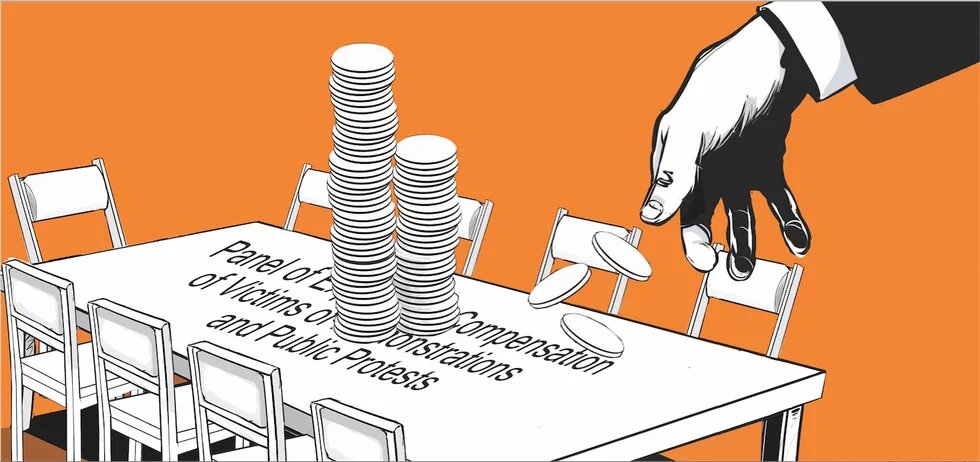Kenya’s newly announced compensation framework for victims of police brutality and enforced disappearances has been welcomed as a step toward redress. But can money alone deliver justice? Without accountability, institutional reform, and an end to impunity, financial settlements risk becoming token gestures.

Since 2017, Kenya has experienced multiple public protests, riots, and demonstrations, linked to issues like taxation, cost of living, policing, human rights concerns, and political conflict. Many incidents involved significant violence, with allegations of police brutality, deaths, injuries, property damage, and violations of civil liberties.
This has resulted in a growing public, legal, and civil society pressure, including some political statements, pushing for accountability and redress for the victims and their families to receive compensation. On August 6, 2025, President Willian Ruto issued a presidential proclamation establishing a framework under the President's Executive Office to deal with grievances.
The framework seeks to design structures for identifying victims, processing claims, and disbursing compensation in collaboration with other bodies such as IPOA, KNCHR, the police, and the Ministry of Health. Funds will be allocated through the Treasury, tied to constitutional obligations of public safety vs civil freedoms.
As this is a welcome move under domestic and international human rights law to provide redress, questions on government intentions, implementation, and enforcement still hang in the balance. For a nation grappling with a disturbing increase in extrajudicial killings and enforced disappearances, a financial settlement, no matter how substantial, cannot serve as a substitute for proper accountability. The actual test of our commitment to human rights is not in the cheques issued, but in the reforms implemented to ensure these injustices never happen again.
A recent report by the Missing Voices Collation, "Brutal Policing 2024", reveals that Kenya is at a critical inflexion point. For years, the coalition has documented cases of police brutality and extrajudicial killing, with the report highlighting a troubling surge in state-sanctioned violence, with 159 cases of extrajudicial killings and enforced disappearances in the past year. Most alarming is the 450% increase in enforced disappearances, a tactic that surged in June during the Gen Z-led protests. This data paints a clear picture: a return to a repressive playbook, where dissent is met with the disappearance of those who dare to speak out. Not only is this a human rights violation, but it is also a setback to Kenyan democracy and a threat to the freedom of speech.
The compensation framework, a seemingly humanitarian gesture that, without accountability, risks becoming a political tool to placate the public and whitewash systemic police violence. While a family's suffering deserves to be acknowledged and mitigated financially, a cheque alone cannot erase the memory of a loved one who was killed or disappeared. It does not address the root cause of the violence, the culture of impunity that has been evident over the years, protecting rogue officers and shielding them from justice. An act that would label the compensation as an act of tokenism if not matched with prosecutions, institutional reform or structural change.
The fact that the compensation only considers cases from 2017 also needs to be unpacked. The cutoff date excludes earlier abuses and events that may still hover as sources of grievance. These cases also include police injured in the protests; the compensation may complicate comparative responsibility, especially if some abuses have not yet been investigated. The government must expand its compensation framework to include all victims of extrajudicial killings and enforced disappearances documented by civil society organisations, including police officers. More importantly, it must ensure that every officer implicated in these abuses is held accountable through a transparent and independent legal process.
Questions on how victims are identified, verified, prioritised, how much is paid, and who determines eligibility all come to question as potential flashpoints. If the process lacks clarity or appears biased or corrupt, it may worsen mistrust, risking the very aim of its formation. The relevant government agencies and stakeholders, such as IPOA, KNCHR and the Office of the Attorney General, must ensure credibility and transparency. Eyes will also be on the Treasury, whose work is to allocate funds, but actual monies might be delayed, insufficient, misallocated or swallowed up by inefficiency or corruption.
Concerns have also been raised that the government may be tempted to limit liability by framing incidents that reduce accountability, such as calling them protester excesses and violence by others and even goons who participated in protests. Similarly, there is a risk of politicisation: victim selection or compensation connected to political favour. If victims feel the government is not sincere, or that victims of police abuse are being silenced, or that compensation is being used to buy off dissent, then the goodwill may quickly fade.
The panel is inactive for now, awaiting a court ruling that halted the implementation on September 8, 2025. The court is hearing a challenge that argues the framework may be unlawful and insufficiently grounded. The Kenyan government insists on its commitment, but practical disbursement, verification, and compensation have not begun.
This presidential announcement signals a critical moment for every Kenyan to demand a justice system that works for all citizens. Civil society organisations and human rights defenders must continue their tireless documentation and advocacy work. International partners must use their influence to press for the end of impunity and support local organisations. A just society cannot be built on the foundation of silence but on the bedrock of accountability and genuine reform, where human rights are not a luxury but a fundamental right for all.